
If you’re interested in wine or tea at all, then you’ve probably heard about tannins. These are natural plant compounds that provide the astringency found in these drinks. Tannins are also controversial, which is why we’re asking: are tannins good for you?
Firstly, there are some health benefits. That’s not surprising, as tannins are plant-based compounds. This feature alone is powerful.
There are also some risks with tannins, particularly if you’re consuming large amounts of them regularly. These risks are why some people look for low tannin red wine and low tannin teas.
Thankfully, the risks of tannins aren’t dramatic and they’re often outweighed by the benefits. Most people will be able to enjoy tannin rich foods and drinks regularly, as long as they pay a little attention to their intake.
Are Tannins Good For You?
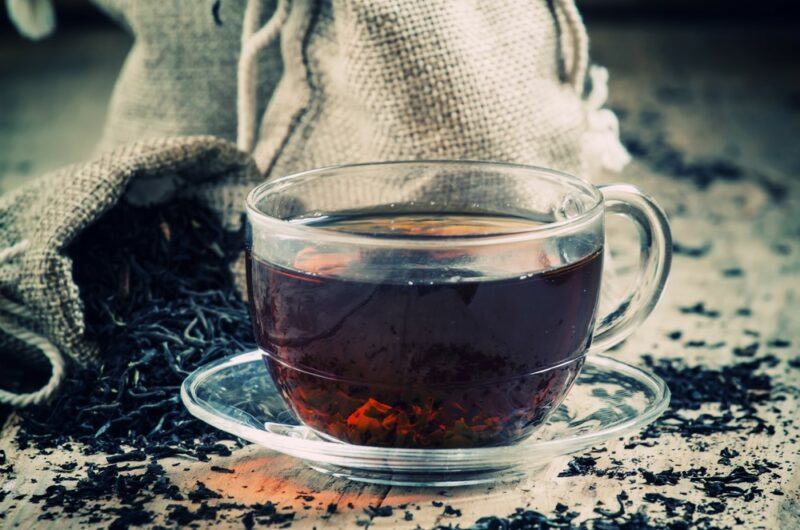
What Are Tannins?
Tannins are a group of antioxidants found in some plants. They’re classified as polyphenols and work to protect plants.
In particular, tannins are both bitter and astringent. This feature should be familiar.
The astringency is what creates the sense of drying your mouth out when you drink high tannin red wine or black tea. The bitterness and astringency make the plant less appealing to predators.
Us humans, though, we approach tannins differently. When processed well and used in the right ways, the features of tannins provide an enjoyable depth of flavor. Red wine, dark chocolate, and coffee are all examples of this pattern.
Tannins have been studied in a variety of ways. We’ll dig into some of that research in the following sections. But, we must also mention that there are huge gaps in our knowledge.
After all, we’re talking about a group of compounds. We know a decent amount about some of the specific compounds and barely anything about others. These knowledge gaps are highly relevant, as each compound can impact our health in a variety of ways.
There’s also some complexity at play. Tannins are defined by how they behave, not by their structure. This sometimes makes it tricky to work out which foods contain tannins and which don’t. For example, tests sometimes show that coffee contains tannins and sometimes that it doesn’t.
Where Are Tannins Found?
Red wine and black tea are the most famous sources of tannins. They’re not your only options though.
Tannins are also found in many types of fruit, like grapes, strawberries, and raspberries. They’re also present in some unexpected foods, including walnuts, chickpeas, lentils, and black eyed peas.
We can’t forget about dark chocolate either. Tannins are responsible for the bitterness of this chocolate, along with some of the health impacts.
Benefits Of Tannins

Tannins are all plant-based antioxidant compounds. This alone is relevant for your health.
The argument is well-known by this stage. Basically, our modern diets and lifestyles promote high levels of oxidative stress and increase the risk of damage to our cells, DNA, and other parts of our body. This effect can then increase the risk of health problems like heart disease, cancer, diabetes, and many others.
Increasing our intake of antioxidants should help to decrease oxidative stress and lower the risk of damage. By doing so, we can reduce our risk of serious diseases and live a healthier life.
Tannins certainly aren’t the only source of antioxidants, but they are a powerful one.
They Reduce Inflammation
It’s not just oxidation that we need to talk about. There’s also inflammation.
This is a biological process that we need, but sometimes there’s too much inflammation in our bodies, which can cause serious harm. Chronic inflammation may even be a key contributor to many modern diseases.
To stay healthy, we need to keep inflammation in check. Tannins have this effect, especially in foods and drinks that are anti-inflammatory anyway (like tea).
The anti-inflammatory effects of tannins are strongly linked to their antioxidant properties. But, they may help in another way too, by improving your balance of gut bacteria.
Relevant For Your Heart Health
We’ve talked about oxidation and inflammation, but what about actual noticeable health benefits? There are some, starting with how tannins can improve your heart health, decreasing your risk of heart disease in the process.
In particular, tannins can help to lower blood pressure. This is critical, as high blood pressure is a key heart disease risk factor. Tannins are also relevant for the tissue around your heart and for promoting healthy blood clotting.
Such effect may be one reason why tea has been linked to so many human health benefits.
They’re Antibacterial As Well
Tannins also have some interesting antibacterial effects. Such effects have mostly been studied in test tubes, so we’re still learning exactly how they do and don’t impact human health.
However, antibacterial properties could easily help our bodies to fight off infection, perhaps even reducing the risk of some diseases.
Some microbes have even been indirectly linked to the development of cancer, suggesting that tannins might even help to lower cancer risk.
Could Help With Your Brain

There are a few ways that tannins may help with your brain. The first is simple – the antioxidants. Because these can reduce oxidative damage, lower the risk of serious issues and protect your brain.
There’s even the chance that tannins slow down neurodegenerative conditions like dementia and Parkinson’s disease. Such effects are powerful, given we don’t have cures for many neurodegenerative diseases.
Tannins could also help with mood by raising the levels of key neurotransmitters. While this area hasn’t been studied much, there’s little doubt that dark chocolate, tea, and even coffee can improve mood – foods that all contain decent levels of tannins.
Might Even Reduce Cancer Risk
There’s also thought that tannins might reduce the formation of tumors and decrease cancer risk. The ability to decrease inflammation and oxidation is particularly relevant here.
More research is needed to work out the strength of this effect and which tannins are most helpful. However, we know that diets rich in fruits, vegetables, and other whole foods tend to reduce cancer risk. Such ingredients are an excellent place to begin.
Side Effects And Risks Of Tannins
Can Decrease Iron Absorption
Tannins are sometimes classified as antinutrients. Antinutrients get their name because they decrease your absorption of some nutrients.
Tannins only affect one nutrient here – iron, but the effect is quite strong.
In fact, regularly drinking high tannin tea at meal time can sometimes lead to iron deficiency anemia. The issue is even more notable on a plant-based diet, as plant-based sources of iron aren’t well absorbed.
There are a few ways around the problem.
One is to avoid having tannins during your meals. You might choose to have your glasses of wine or mugs of tea between meals instead.
You could also just have some days where you don’t consume many tannins and get plenty of iron. Doing so should help to offset any iron absorption issues.
Having vitamin C at the same time as tannins helps mitigate this effect and increases your iron absorption.
May Promote Headaches
There’s also the chance that tannins lead to increased headaches and migraines.
This isn’t a common side effect and it hasn’t been proven in scientific studies. Still, plenty of people do report increased headaches from drinking black tea or red wine – an effect that may be related to the tannins.
That said, the effect mightn’t come from the tannins at all. For example, regular headaches from black tea could easily be related to caffeine rather than tannins. Similarly, anyone sensitive to alcohol is at a greater risk of headaches from red wine.
This is why it’s so important to experiment.
See what happens when you change one source of tannins for another. Do you still get the same headache effect? What about switching black tea for green tea?
As you make such tweaks, it should get easier to see where your side effects are coming from – and what you can do about them.
They Promote Teeth Staining
Tannins don’t directly stain your teeth, but they do make it easier for stains to stick.
This means that dark tannin rich drinks have a decent chance of staining your teeth, especially if you’re drinking them regularly. Coffee can easily have this effect, but so too does black tea and red wine.
In fact, black tea is one of the worst offenders, due to the combination of color, tannins, and acidity.
Having a glass of water after your coffee or tea can reduce the risk of stains. Adding milk to coffee or tea may also be helpful, as this gives the drink a lighter color.
Tannic Acid Vs Tannins
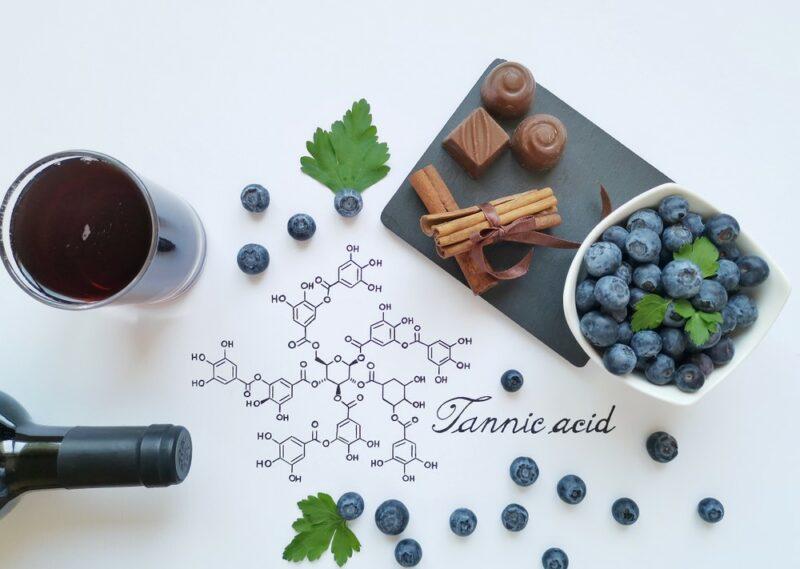
If you’ve spent any time looking at tannins, you’ve probably seen the term tannic acid. Some posts even focus specifically on the benefits and risks of tannic acid.
The idea can get a bit confusing. What is tannic acid? How does it relate to tannins?
Basically, tannic acid is a specific molecule with the formula C76H52O46. It has some of the features that we’ve been talking about – because it is a type of tannin.
However, tannic acid is just one of many individual tannins. Some of these look quite different than others, because tannins are defined by their function, not their structure.
The distinction is important because some foods are high in tannins but don’t contain much tannic acid at all.
Should You Consume Tannins?
It would be easy to say that tannins should be avoided because of their negative effects.
But, that’s an awful stance to take with nutrition. Almost every type of food or drink comes with some potential negative effects. That’s just how it works. After all, foods contain many different compounds and each of these can influence your health in various ways.
Tannins aren’t too bad for risks anyway.
The biggest issue is that they can impact your iron absorption and perhaps lead to anemia. That’s only if you’re not careful, though. You can easily sidestep the problem by consuming tannin rich drinks between meals, rather than at meal time.
Remember too that most tannin rich foods have plenty of other benefits. Tea is a classic example, as it’s famous as a healthy drink. Studies consistently link regular tea consumption to improved health – so the tannin content clearly isn’t a problem.
Final Thoughts
Tannins come with many benefits and few risks. Plus, they’re common in dark chocolate, tea, coffee, and red wine – ingredients that are all powerful for health.
The best thing you can do is to pay attention to the amount you consume and whether you experience any side effects. This is a good general practice for keeping you healthy anyway.
Frequently Asked Questions
Does Coffee Have Tannins?
Coffee is often defined as containing tannins, which is partly why they give you a slight dry mouth. However, things are a little complex, as some compounds are classified as tannins by some authors and not by others.
Do Herbal Teas Have Tannins?
Tannins aren’t limited to traditional teas. Some types of herbal teas contain tannins as well, including chamomile and cinnamon tea.
Herbal tea may contain fewer tannins than black tea, but it’s hard to know, as there hasn’t been much research on the topic. What’s more, the tannins are likely to be different between herbal tea and regular tea, so their effects could also vary.
Do Tannins Cause Headaches?
Tannins are thought to be the reason that red wine gives some people headaches. This may be because the tannins lead to serotonin release, which can be an issue for some people.
But, the headache effect isn’t universal. Some people can have high amounts of tannins without any issues at all.
Do Tannins Stain Teeth?
Tannins can cause stains on your teeth. This is why you’ll sometimes get a yellowish stain from black tea and also why red wine stains your teeth.
Are Tannins Acidic?
Tannins are weakly acidic. That said, a few theories suggest that tannins may have an alkaline effect in some systems.







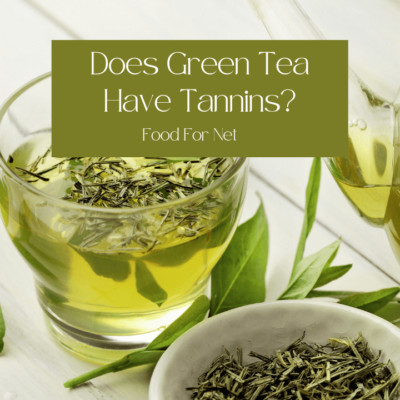

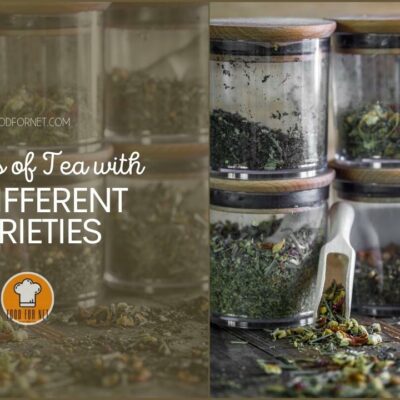


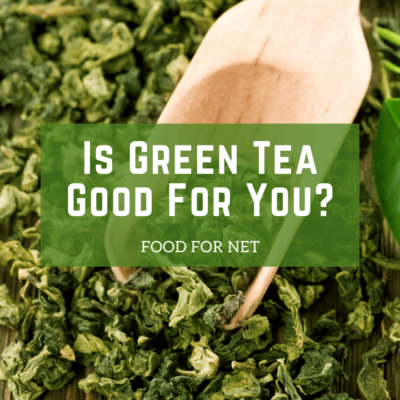
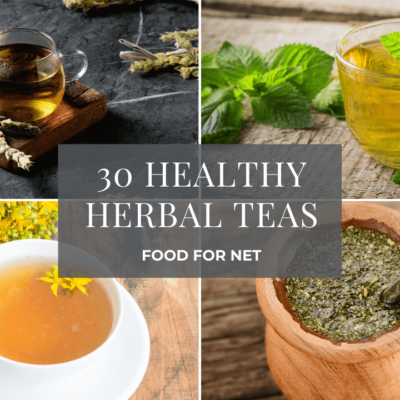

 5 Best Snack Brands For Healthy Munchies!
5 Best Snack Brands For Healthy Munchies!
Leave a Reply